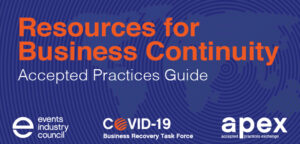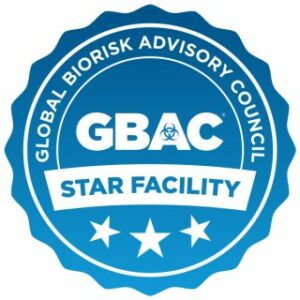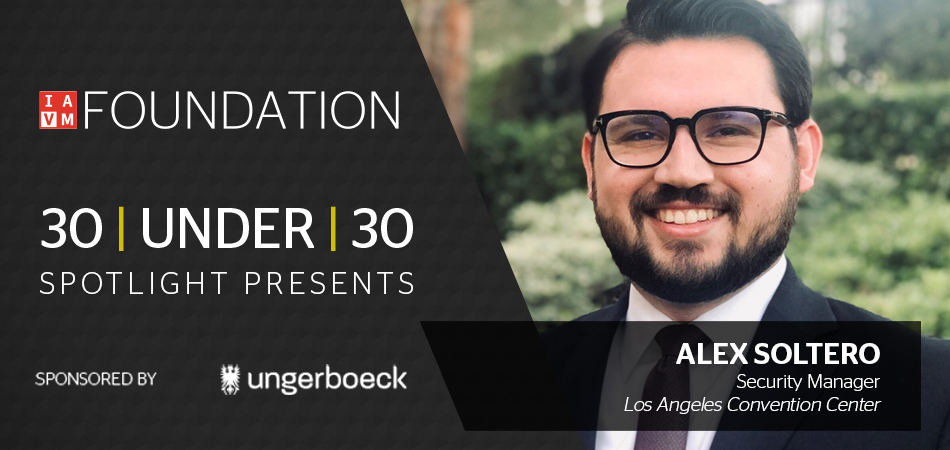Events Industry Council Releases Resources for Business Continuity Accepted Practices Guide
The Events Industry Council (EIC) released the latest deliverable from the APEX COVID-19 Business Recovery Task Force: the Resources for Business Continuity Accepted Practices Guide.
The new guide focuses on:
How organizations prepare for future crises or disruptions, such as the current global pandemic
How businesses reliant on in-person events navigate through a crisis when such traditional in-person event models are not possible
Curating business continuity resources for event professionals
Understanding and implementing value-based adaptions and innovations
To access the resource, click here.
Longest-Tenured Employee at the New Orleans Ernest N. Morial Convention Center Retires After 36-Year Career
By Convention Center Staff and R.V. Baugus
Working in the public assembly venue industry, we all know, can get into one’s blood, regardless of the position served and regardless of the sector type.
The New Orleans Ernest N. Morial Convention Center would like to extend gratitude and congratulate Mr.  Willard Trosclair, the Facility Attendant in the Building Maintenance Department, on his retirement after an admirable 36-year career. Trosclair joined the New Orleans Convention Center in January 1984 prior to the facility’s first use as the Louisiana Pavilion of the World’s Fair in May 1984.
Willard Trosclair, the Facility Attendant in the Building Maintenance Department, on his retirement after an admirable 36-year career. Trosclair joined the New Orleans Convention Center in January 1984 prior to the facility’s first use as the Louisiana Pavilion of the World’s Fair in May 1984.
MTrosclair is the longest tenured employee at the Center and is a well-known presence around the facility. He celebrated his final day at the Center on January 13 2021.
“Being employed at a single establishment for more than three-and-a-half decades is an outstanding accomplishment. We are so proud of our entire team for fostering a culture of dedication and achievement, and Willard Trosclair epitomizes what it means to be a loyal, tenured part of our extraordinary team,” said Michael J. Sawaya, Convention Center President.
“Willard has been a staple of our facility for the last 36 years. While we are sad to see him go, we are incredibly grateful for his service and wish him all the best in his well-deserved retirement,” Sawaya continued.
Super Bowl, Final Four Stadiums Among Latest to Become GBAC STAR Accredited
By ISSA and R.V. Baugus
Raymond James Stadium plans to welcome about 22,000 spectators for the championship game on Feb. 7, 2021, featuring the Kansas City Chiefs and the city’s very own Tampa Bay Buccaneers. Meanwhile, Lucas Oil Stadium will host the NCAA quarterfinals in late March and the semifinals in early April. Each stadium fulfilled 20 program elements to achieve accreditation and display the GBAC STAR accreditation seal.
The latest list of facilities to achieve GBAC STAR™ accreditation also includes the world’s first children’s museum and arboretum in Salt Lake City’s Discovery Gateway Children’s Museum and Red Butte Garden and Arboretum.
“The goal of GBAC STAR accreditation is twofold. First and foremost, it helps protect frontline employees  and cleaning staff from biological risks,” said GBAC Executive Director Patricia Olinger. “It also gives the public confidence to enter these accredited facilities knowing that they understand how best to clean, disinfect, and prevent infectious disease outbreaks.”
and cleaning staff from biological risks,” said GBAC Executive Director Patricia Olinger. “It also gives the public confidence to enter these accredited facilities knowing that they understand how best to clean, disinfect, and prevent infectious disease outbreaks.”
GBAC STAR teaches the proper protocols, correct disinfection techniques, and cleaning best practices for biohazard situations like the novel coronavirus. The accreditation is valid for one year, at which point facilities undergo a reaccreditation process to showcase their ongoing commitment to maintaining safe and clean spaces. To date, more than 1,100 facilities around the world have achieved GBAC STAR accreditation and an additional 2,700 are currently pursuing the designation.
This week, the following facilities have earned GBAC STAR accreditation, the gold standard for facility preparedness:
Arenas and Stadiums
Lucas Oil Stadium in Indianapolis, home to the NFL’s Indianapolis Colts
Raymond James Stadium (Tampa Sports Authority) in Tampa, Fla., home to the NFL’s Tampa Bay Buccaneers
The Allen County War Memorial Coliseum in Fort Wayne, Ind.
Olympia Entertainment, Little Caesars Arena in Detroit, home of the Detroit Red Wings and Detroit Pistons
Will Rogers Memorial Center in Fort Worth, Texas
Convention Center
Fort Worth Convention Center in Fort Worth, Texas
Greater Richmond Convention Center in Richmond, Va.
Hilton DFW Lakes Executive Conference Center in Grapevine, Texas
Indiana Convention Center in Indianapolis
Performing Arts Centers
Coca-Cola Music Hall in San Juan, Puerto Rico
Vina Robles Amphitheatre in Paso Robles, Calif.
Theaters
Riverside Theater in Milwaukee.
“As the novel coronavirus pandemic demonstrates, infectious disease can spiral out of control when we’re ill prepared,” said ISSA Executive Director John Barrett. “With GBAC STAR accreditation, we’re giving facilities the tools to prepare for, respond to, and recover from outbreaks so they can protect their customers and employees, even during times of uncertainty.”
For more information about GBAC STAR™ facility accreditation, visit gbac.org/star
To locate facilities that have achieved or are in the process of earning accreditation, visit the GBAC STAR Facility Directory at gbac.org/directory.
IAVM members seeking to apply for accreditation through GBAC, please use the link https://gbac.issa.com/iavm/!
San Diego Convention Center Announces 2021 Board Officers; Elvin Lai to Serve as Chair
By Maren Dougherty
The San Diego Convention Center Corporation announced the 2021 officers of its Board of Directors. Hospitality executive and entrepreneur Elvin Lai will serve as Board Chair.
“My top priority as the incoming Chair is to build and execute a strategic recovery plan,” Lai  said. “Knowing the vital role the San Diego Convention Center plays in our region’s economy, I am dedicated to ensuring the sustainability and success of this organization for our community’s benefit.”
said. “Knowing the vital role the San Diego Convention Center plays in our region’s economy, I am dedicated to ensuring the sustainability and success of this organization for our community’s benefit.”
Lai assumes his leadership role during the COVID-19 pandemic, with SDCC continuing to serve as an emergency shelter in support of Operation Shelter to Home to assist individuals experiencing homelessness. In addition to serving as a shelter since April 1, 2020, SDCC has supported other essential activities, including hosting a super polling location for the 2020 Presidential General Election. With the distribution of vaccines now underway, industry professionals expect convention activity to resume this year.
“2021 will be a critical year as we prepare to safely reopen. We are encouraged by the interest we continue to hear from meeting planners and attendees about returning to in-person gatherings, and we are prepared to evolve aspects of our operations to meet new guidelines and expectations,” said Rip Rippetoe, CVE, SDCC’s President and CEO as well as IAVM Chair. “With our capable and innovative team of staff, board members, and partners, I believe in our ability to rise to challenges and return to our primary role as an economic engine for San Diego.”
Maren Dougherty is Director, Marketing & Communications for the San Diego Convention Center Corporation.
30|UNDER|30 Spotlight: Alex Soltero

Security Manager, Los Angeles Convention Center
Alex Soltero is a Security Manager at the Los Angeles Convention Center where he coordinates, manages, and helps execute security plans for a variety of events. He has had the pleasure of working with numerous high-profile clients and dignitaries, as well as local and federal agencies to deliver safe and successful experiences. He looks forward to growing within the industry and continuing to build relationships with his peers.
When I learned that I would be included in IAVM’s 30|U|30 Class of 2020 I felt extremely honored and humbled. It felt surreal to have been chosen for the honor from among a group of incredibly talented and influential candidates.
Join your Foundation in congratulating Alex on being honored as one of the 30|UNDER|30 Class of 2020 and don’t forget to come back each Thursday as we spotlight another honoree!
Do you want to receive a Front Row News weekly digest?
Categories
- Allied (856)
- Architecture (147)
- Arenas (744)
- Career (890)
- Convention Centers (889)
- Education (608)
- Events (1,528)
- Food & Beverage (193)
- Foundation (113)
- Guest Experience (1,482)
- Industry News (2,253)
- Leadership (1,872)
- Marketing (150)
- Membership (1,985)
- Music (212)
- Performing Arts Centers (453)
- Professional Development (398)
- Research (127)
- Safety & Security (425)
- Sports (763)
- Stadiums (607)
- Student (159)
- Technology (515)
- Ticketing (92)
- Touring (82)
- Trends (357)
- Uncategorized (771)
- Universities (216)
- Video (25)
- Young Professional (198)
Twitter Feed
- Twitter feed loading
Recent Posts
- GEODIS Park Selects Allied Universal As Its Preferred Event Services Provider
- Venuworks Appoints Marc Solis as Executive Director of the Fresno Convention and Entertainment Center
- Los Angeles Convention Center Diverts 8,000 Pounds of Wood Waste to Local Foundation Supporting Fire Victims
- Fort Worth Unveils Plans for Phase 2 of Convention Center Transformation
- San Diego Convention Center CEO Announces Retirement After a Decade of Leadership
Categories
- Allied
- Architecture
- Arenas
- Career
- Convention Centers
- Education
- Events
- Food & Beverage
- Foundation
- Guest Experience
- Industry News
- Leadership
- Marketing
- Membership
- Music
- Performing Arts Centers
- Professional Development
- Research
- Safety & Security
- Sports
- Stadiums
- Student
- Technology
- Ticketing
- Touring
- Trends
- Uncategorized
- Universities
- Video
- Young Professional
Archives
- February 2026
- January 2026
- December 2025
- November 2025
- October 2025
- September 2025
- August 2025
- July 2025
- June 2025
- May 2025
- April 2025
- March 2025
- February 2025
- January 2025
- December 2024
- November 2024
- October 2024
- September 2024
- August 2024
- July 2024
- June 2024
- May 2024
- April 2024
- March 2024
- February 2024
- January 2024
- December 2023
- November 2023
- October 2023
- September 2023
- August 2023
- July 2023
- June 2023
- May 2023
- April 2023
- March 2023
- February 2023
- January 2023
- December 2022
- November 2022
- October 2022
- September 2022
- August 2022
- July 2022
- June 2022
- May 2022
- April 2022
- March 2022
- February 2022
- January 2022
- December 2021
- November 2021
- October 2021
- September 2021
- August 2021
- July 2021
- June 2021
- May 2021
- April 2021
- March 2021
- February 2021
- January 2021
- December 2020
- November 2020
- October 2020
- September 2020
- August 2020
- July 2020
- June 2020
- May 2020
- April 2020
- March 2020
- February 2020
- January 2020
- December 2019
- November 2019
- October 2019
- September 2019
- August 2019
- July 2019
- June 2019
- May 2019
- April 2019
- March 2019
- February 2019
- January 2019
- December 2018
- November 2018
- October 2018
- September 2018
- August 2018
- July 2018
- June 2018
- May 2018
- April 2018
- March 2018
- February 2018
- January 2018
- December 2017
- November 2017
- October 2017
- September 2017
- August 2017
- July 2017
- June 2017
- May 2017
- April 2017
- March 2017
- February 2017
- January 2017
- December 2016
- November 2016
- October 2016
- September 2016
- August 2016
- July 2016
- June 2016
- May 2016
- April 2016
- March 2016
- February 2016
- January 2016
- December 2015
- November 2015
- October 2015
- September 2015
- August 2015
- July 2015
- June 2015
- May 2015
- April 2015
- March 2015
- February 2015
- January 2015
- December 2014
- November 2014
- October 2014
- September 2014
- August 2014
- July 2014
- June 2014
- May 2014
- April 2014
- March 2014
- February 2014
- January 2014
- December 2013
- November 2013
- October 2013
- September 2013
- August 2013
- July 2013
- June 2013
- May 2013
- April 2013
- March 2013
- February 2013
- January 2013
- May 2012
- March 2012
- December 2011
- November 2011
- October 2011
Recent Comments
- Frank Bradshaw, Ph.D., CVE on John Meyer, CVE, a Tireless Advocate of Certification for Venue Professionals, Has Died
- Neil Sulkes on Hilary Hartung, Friend to Many in Venue Marketing, Has Left Us
- Jason Parker, CVE on The Devastation of Hurricane Helene and How We Can Support One Another
- Larry Perkins on Touhey Testifies Against Speculative Ticketing Before Congressional Subcommittee
- Peter Secord on Major Players for Planned Elkhart Amphitheater Were in the Mix at VenueConnect
